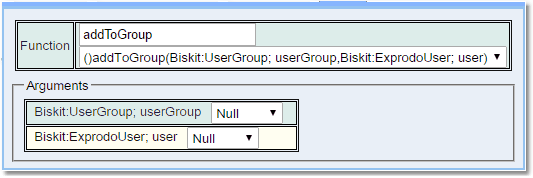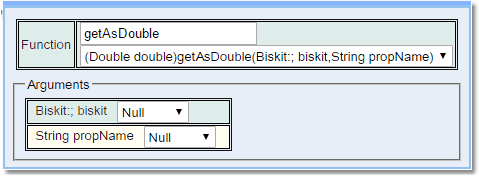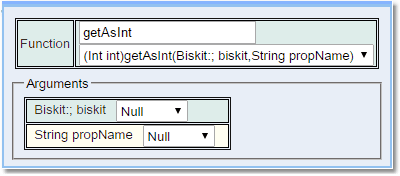Biskit Function Type
Function |
Description |
|---|---|
addToGroup |
Adds an object to its appropriate Group. |
biskitDef |
Returns the BiskitDef for the type of a given Biskit. |
copy |
Copies the properties from one Biskit to another. May return the new Biskit. |
enumerateBiskitProperties |
Returns a list of Biskits each of which describe a property in the Biskit. |
expandRepeats |
Expands the repeats for a Biskit |
find |
Returns a list of Biskits of a particular BiskitDef with the input id's (DB primary key). |
formEncode |
Returns a form encoded version of the input Biskit. |
getAsBiskit |
Returns the value of any property as a Biskit. |
getAsBiskitList |
Returns a property of a given name from a biskit, and returns its value as a list of biskits. |
getAsBoolean |
Returns the value of any property as a Boolean. |
getAsDate |
Returns the value of any property as a Date. |
getAsDateList |
Returns the values of a property as a list of Dates. Only works on list or set properties. |
getAsDateTime |
Returns the value of any property as a DateTime. |
getAsDouble |
Returns the value of any property as a Double. |
getAsDoubleList |
Returns the values of a property as a list of Doubles. Only works on list or set properties. |
getAsInt |
Returns the value of any property as a Int. |
getAsIntList |
Returns the values of a property as a list of Integers. Only works on list or set properties. |
getAsLong |
Returns the value of any property as a Long. |
getAsLongList |
Returns the values of a property as a list of Longs. Only works on list or set properties. |
getAsString |
Returns the value of any property as a String. |
getAsStringList |
Returns the values of a property as a list of Strings. Only works on list or set properties. |
hasProperty |
Returns True if the property exists on the Biskit. |
identity |
Returns the Biskit passed in unchanged. |
mapBiskitProperties |
Returns a new Biskit as a copy of a given Biskit. |
printBiskit |
Returns a formatted version of the Biskit as a String |
propertyDef |
Returns a PropertyDef from a BiskitDef and a path to the property. |
removeFromGroup |
Removes a User from a User Group. |
setProperty |
Sets the value of a property. |

The user provides the User Group and the User. Nothing is returned.

The user provides the Biskit or type of Biskit. Returned is the BiskitDef.

To copy a Biskit the user provides the Biskit to be copied and the Biskit to be updated. Nothing is returned.
The alternative is to create a Biskit of a specific type BiskitDef and optionally save it to the database.This returns the Biskit that was created.
preferUSDateFormat: true if US formatted are preferred when trying to parse any date property and false if European formatted dates preferred.
format: the Date and Time pattern to be used when converting a property from a string.
Note: If the workflow copies to a pre-existing biskit that has previously been saved to the database, then the copy will also cause an update to be sent to the database. If, on the other hand, the workflow either copies to a pre-existing biskit that has never been saved to the database, or doesn't copy to a pre-existing biskit, then the copy is not saved to the database.

The user provides the Biskit to be searched and optionally the Property Type to be found. Returned is a list of Biskits that match the search each of which describes the properties in a given biskit.

The user provides the Biskit to be expanded and the dates defining the period to be expanded over, or the start date and the number of days to be included in the expansion or null to use the standard as set in Global Preferences. Returned is the list of expanded repeats, or a list of just the original if the original did not repeat

The user provides the BiskitDef to be searched and the list of database ids (primary keys) that will be used for the search. Returned is a list of Biskits that match the search.

The user provides the Biskit to be encoded. Returned is a form encoded version of the Biskit.
Encodes the properties of a Biskit in a suitable format for use as the body of a response to an HTTP event that expects a form POST. Ignored are all properties that are of type Set, List, User defined or DateRange

The user provides the Biskit and the name of the property whose value is to be returned. Returned is the value of the property as a Biskit, if it is a Biskit, and null otherwise. The user can optionally specify the expected BiskitDef, if the Biskit is not of this type then null is returned.

The user provides the Biskit and the name of the property whose value is to be returned. Returns a property of a given name from a Biskit, and returns its value as a list of Biskits. If the original property is not a list or set property, then return null. Otherwise, check if each element in the source collection is a Biskit. For each element, if it is a Biskit its value is used, otherwise null is used in its place.

The user provides the Biskit and the name of the property (Boolean, Int, Long or Double)whose value is to be returned. Returned is the value of the property as a Boolean, if such conversion is possible, and null otherwise. Numeric properties are converted with zero meaning false and anything else non-null meaning true.

The user provides the Biskit and the name of the property (Date or DateTime) whose value is to be returned. Returned is the value of the property as a Date, if such conversion is possible (will attempt to convert from Long and String values), and null otherwise.
preferUSDateFormat: true if US formatted are preferred when trying to parse the date and false if European formatted dates preferred.
format: the Date and Time pattern to be used when converting from a string.

The user provides the Biskit and the name of the property. Returns the value of the property as a list of Date or DateTime, if such conversion is possible (will attempt to convert from Long and String values), and null otherwise.This only works on List or Set properties other types cause a null to be returned.
preferUSDateFormat: true if US formatted are preferred when trying to parse the date and false if European formatted dates preferred.
format: the Date and Time pattern to be used when converting from a string.

The user provides the Biskit and the name of the property (Date or DateTime) whose value is to be returned. Returned is the value of the property as a DateTime, if such conversion is possible (will attempt to convert from Long and String values), and null otherwise.
preferUSDateFormat: true if US formatted are preferred when trying to parse the date and false if European formatted dates preferred.
format: the Date and Time pattern to be used when converting from a string.

The user provides the Biskit and the name of the property (Int, Long or Double) whose value is to be returned. Returned is the value of the property as a Double, if such conversion is possible, and null otherwise.

The user provides the Biskit and the name of the property (Int, Long or Double) whose value is to be returned. Returned is list of values of the property as a Double, if such conversion is possible, and null otherwise. This only works on List or Set properties other types cause a null to be returned.

The user provides the Biskit and the name of the property (Int, Long or Double) whose value is to be returned. Returned is the value of the property as an Int, if such conversion is possible, and null otherwise.
Long and Double values will be used as-is (truncated to an integer if required) if they are within the standard integer range. Otherwise they will be returned as either the maximum integer value or minimum integer value, as appropriate. The minimum and maximum integer values are -2,147,483,648 and 2,147,483,647 respectively. That is, -231 and 231 -1.

The user provides the Biskit and the name of the property (Int, Long or Double) whose value is to be returned. Returned is list of values of the property as an Int, if such conversion is possible, and null otherwise. This only works on List or Set properties other types cause a null to be returned
Long and Double values will be used as-is (truncated to an integer if required) if they are within the standard integer range. Otherwise they will be returned as either the maximum integer value or minimum integer value, as appropriate. The minimum and maximum integer values are -2,147,483,648 and 2,147,483,647 respectively. That is, -231 and 231 -1.

The user provides the Biskit and the name of the property (Int, Long or Double) whose value is to be returned. Returned is the value of the property as a Long, if such conversion is possible, and null otherwise.
Integer and Double values will be used as-is (truncated to an integer if required) if they are within the standard integer range. Otherwise they will be returned as either the maximum long integer value or minimum long integer value, as appropriate. The minimum and maximum integer values are -9,223,372,036,854,775,808 and 9,223,372,036,854,775,807 respectively. respectively. That is, -263 and 263 -1.

The user provides the Biskit and the name of the property (Int, Long or Double) whose value is to be returned. Returned is list of values of the property as an Long, if such conversion is possible, and null otherwise. This only works on List or Set properties other types cause a null to be returned
Integer and Double values will be used as-is (truncated to an long if required) if they are within the standard long integer range. Otherwise they will be returned as either the maximum long value or minimum long value, as appropriate. The minimum and maximum long integer values are -9,223,372,036,854,775,808 and 9,223,372,036,854,775,807 respectively. That is, -263 and 263-1

The user provides the Biskit and the name of the property whose value is to be returned. Returned is the value of the property as a String.

The user provides the Biskit and the name of the property whose value is to be returned. Returned is list of values of the property as a String. This only works on List or Set properties other types cause a null to be returned

The user provides the Biskit and the name of the property. Returned is True if the property exists on the Biskit even if its value is Null.

The user provides the Biskit. Returned is the Biskit.

The user provides the Biskit. Returned is the Biskit.
The user provides a prefix and suffix to add and to remove. The prefix/suffix is removed from the existing property names if they match the property names found, and then the prefix/suffix is prepended or appended as appropriate.
If any prefix or suffix is null, then it is treated the same as if it were the empty string.
For example, there is a Biskit with properties of names X_1, X_2 and X_3, then setting the removal prefix to X and the addition prefix to Y would result in a Biskit with properties Y_1, Y_2 and Y_3.

The user provides the Biskit, and whether to recursively output the properties on nested Biskits. Returned is the formatted Biskit as a string

The user provides the Biskit, and a path to the PropertyDef required. Returned is the PropertyDef.

The user provides the User Group and the User. Nothing is returned.

The user provides the Biskit and the name of the property whose value is to be updated as well as the new value. Nothing is returned.
